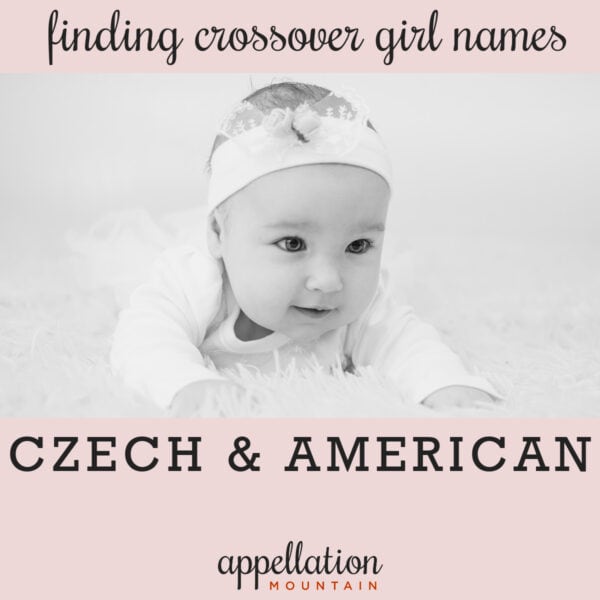If Claire and Lucy are too popular for your tastes, perhaps you’ll consider this name with a similar meaning, but far more exotic sound.
Thanks to JNE for mentioning her during the holiday season. Our Name of the Day is Svetlana.
Starbaby Vivienne Jolie-Pitt might just revive French names, and first daughter Natasha Obama could propel Russian appellations to new heights.
While plenty of Slavic names translate easily into English, Svetlana is an interesting case. She’s certainly not as accessible as Natasha, Anya or Larissa. But she’s surprisingly easy to pronounce. Perhaps that’s because of her similarity to the word svelte. sveht LAHN nah might not roll off the tongue, but neither does she trip us up.
Like Claire and Lucy, Svetlana is said to mean “light.” There is a Saint Svetlana in the Russian Orthodox Church, but Catholics know her as Saint Photina. (If that has you scratching your head, remember that the Greek photos means light, too.) By either name, in the New Testament she’s “the woman by the well.” After Jesus spoke to her, she converted and was later martyred.
But let’s put faith aside because her real source of popularity is literary. In 1813, Vasily Zhukovsky penned his poem “Svetlana.” Zhukovsky may not be as big a name as Dostoyevsky, but he’s responsible for introducing Romanticism to Mother Russia. Back in the day, he made a lot of noise. (In fact, another writer had apparently coined the name, but it was Zhukovsky’s poem that got credit.)
Interestingly, the first English translator of the poem opted to discard Svetlana. Sir John Bowring said that Svetlana “does not easily accommodate itself to our organs of sense.” Bowring called her Catherine instead.
The loyal Svetlana from the poem inspired many parents, and today she’s about as traditional a Russian name as you can imagine. She’s been worn by:
- Stalin’s daughter;
- A long list of athletes – gymnasts, skiers, ice skaters, biathletes;
- The current First Lady of Russia, Svetlana Medvedeva;
- Svetlana Savitskaya, a former cosmonaut and, in 1984, the first woman to perform a space walk.
If you’re naming a fictional Russian woman born after 1825, Svetlana is a safe bet. In fact, sci fi write Sergei Lukyanenko created a character called Svetlana for his 1998 Night Watch novel. It’s since become a series and a movie.
If Svetlana has a drawback, it is her common nickname – Sveta. Somehow it sounds like a heavily accented pronunciation of “sweater” instead of a charming import. Still, with that ending, your little Svetlana could easily answer to Lana.
If V really is the new Z, parents could find this one an appealing option. She’s a valid name with history, but has never appeared in the US Top 1000. If you haven’t a drop of Slavic blood, it might feel like a stretch. But if Anya and Larissa catch fire, why not Svetlana?




Hello everyone my name is Svetlana and my parents are mexicans but I was born in the. U.S.A, my mother had no choice in choosing my name because my father was dead set in naming me, although my mother says he probably got the name from one of his lovers lol. Growing up I really didn’t like the name Svetlana because no one could pronounce it, but now that I’m older I love my name. My grandmother could not pronounce it so she nicked named me Seve. 😉 people always ask me if I am russian because I’m light skin n green eyes;)
My name is Svetlana. I was born in Russia, but am now residing in the USA. I always hated being nicknamed “Lana,” but my friends have learned to adapt.
My name is Svetlana. I was born in Ukraine and later moved to the U.S. where I now go by Lana (not as a rule, but it’s easier for most people), and I have always really liked my name. I like the way it sounds when other people say it, probably because I don’t hear it very often.
i am Lana and i like my name very much… 🙂
the name Lana is most popular name for baby – girls in Croatia in last two years 🙂
That’s an interesting point about “coming to a consensus”, Verity. I’d like to know the answer to that one too.
The closest thing I have to a Biblical scholar around here is my father, a pastor with his doctorate in theology. He’s asleep at the moment, but tomorrow I’ll ask him about this and see if he has any clue. Since he’s a Presbyterian and went to a Presbyterian seminary, I don’t know how much he knows about Catholic and Orthodox customs (the Presbyterian church doesn’t have saints and the like), but it’s worth asking him anyway. I’ll let you all know if he says anything interesting. 🙂
*Orthodox church
Sorry, I’m tired today.
Also, the woman at the well’s name isn’t mentioned, at least not in the NIV or ESV Bibles I have lying around. Did the Orthodox assign the name to her, or is there a historical link there?
You’re right – she’s not named in the Bible. Thanks for catching that! There are two possibilities. One, she could be named by custom – like the three wise men or a handful of other Biblical women. That would explain why the Orthodox and the Roman Catholics have different names for her.
Alternately, she might’ve been listed in later historical accounts. I know Photina shows up in at least one medieval list of martyrs. If that’s the case, then they just translated Svetlana.
I’m not sure *how* so many Biblical figures came to pick up names by custom … I understand why they would, as they retold the stories. But how did they come to consensus? Hmmm … I need to find a Biblical scholar.
Just saw this post and thought I’d give my input. I’m Greek Orthodox, and while it might not be the answer you’re looking for, this is what I know. The Orthodox and Catholic churches, while they consider the Bible an integral, necessary, and divinely inspired authority on Christian faith, do not rely on scripture alone as their sole source of doctrine, partly because the Bible, too, was passed down through sacred tradition along with oral tradition, art, and other texts not considered to be divinely inspired or equal to the Bible. These other traditions include names of saints, some of whose characters are mentioned, but nameless, in the Bible. These names are thought traditionally to have been passed down, first orally and then on paper, from the day the events occurred. Have some of them been passed down incorrectly or translated very differently from the original? Perhaps the have, and most likely so. But the Orthodox churches don’t consider these names to be “Gospel truth” anyway, so does it matter? Probably not, and not to us at least. It’s nice to put a name to a story, anyway, even if there’s the chance that it could be incorrect.
I know a Svetlana. Well, I’m acquainted with one, at least; she’s a cashier at the local grocery store. She goes by Svet. She’s one of my favorite cashiers, very efficient, yet friendly. I asked her about her name once and she told me that it’s a common name in Russia, where her parents came from (she doesn’t have an accent, so I assume that she was born here). I always thought her name was lovely. I don’t think I’d use it, though; a bit too delicate for my tastes. I’d like to see it on someone else’s kid, though.
???????, JNE! Even Katya is great with all its phenomenal dimunitives. Don’t you just love that about Russian names?
Otlichno, Kim! Great to see another Russian laguage type around! (I was boring old Katya in my Russian classes and admired those who chose their Russian names with more forethought as I progressed through the years).